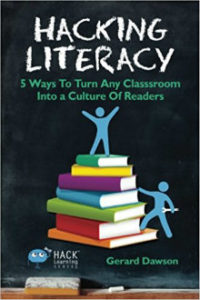5 Hacks Can Help Create a Culture of Readers
Hacking Literacy: 5 Ways To Turn Any Classroom Into a Culture Of Readers
By Gerard Dawson
(Times 10 Publications, 2016 – Learn more)
 Reviewed by Laura Von Staden
Reviewed by Laura Von Staden
Gerard Dawson’s short (<100 pages) book is loaded with ideas and procedures that can be implemented immediately to impact the reading culture in your classroom.
There are five chapters (Hacks), each of which starts with the problem, the hack (the fix), what you can do tomorrow, a blueprint for full implementation, ideas to overcome pushback, and the hack in action.
 The best part is that you don’t have to use all the ideas and steps in any of the sections to be able to implement these “hacks” in your classroom or school immediately – and change your literacy culture. With the numerous lists of what you can do tomorrow, you need only choose one, two or a few at a time, and thus are more able to change your literacy culture immediately.
The best part is that you don’t have to use all the ideas and steps in any of the sections to be able to implement these “hacks” in your classroom or school immediately – and change your literacy culture. With the numerous lists of what you can do tomorrow, you need only choose one, two or a few at a time, and thus are more able to change your literacy culture immediately.
Reaching struggling students
The author argues that literacy is the “Mega-Hack.” Developing a culture where literacy reigns, especially for our most struggling students, changes all areas of education (and their futures). He further argues that our current approach to literacy instruction tends to inhibit rather than encourage a love of literacy – reading, writing, and books – in our students.
Very often, Dawson says, our most struggling students have had limited interactions with books outside the classroom. The books these students have typically accessed are ones they’ve been required to read for an assignment. Quite often the reading materials do not appeal to them, their interests, or strengths (and may not have been at an appropriate level for them).
As a result, students end up resisting further interactions with books based on their negative past experiences, which leads to fewer literacy skills, which then further intimidates these students from wanting to engage in literacy learning.
To create a culture of readers/writers, Dawson believes, reading and writing has to be more personalized and authentic, giving students greater power to use their interests, strengths, and enjoyment to drive our literacy design, and making sure that students are introduced to the right books to help them foster a love of reading, writing and literature.
Supporting a culture of literacy
This book gives many ideas on how to make small to large changes in our classrooms and school – creating an “encouraging” culture where students want to engage in literacy for multiple reasons, including academic, personal, and pleasure. After all, the greatest way to build reading skills over time is lots of reading.
Dawson provides many bulleted lists, questions to ask, and steps to follow, including:
• how to know what books would be best for each student,
• how to manage a classroom library without the hassles,
• how to allow students to choose materials that align with standards without overwhelming the teacher
• and many more!
What I plan to try immediately
One of my favorite “hacks” that I will be implementing is having students do their “reading logs” in class, using topic notebooks. Another is the book talk. I will start by doing some of book talks myself first and then have my students begin doing them (as outlined in the book, to reduce student anxiety of public speaking).
This book is full of great ideas and ways to implement “hack literacy” quickly and easily. It is definitely worth the read. I would highly recommend Dawson’s ideas to any teacher or even parents who want to help their children embrace literacy.
Dr. Laura Von Staden is a Middle School Special Education Lead Teacher in Tampa, Florida. She serves on numerous committees both at her school and within her district, and works closely with the local university where she is a Professional Practice Partner and master mentor. Dr. Von Staden also facilitates both online and face-to-face Professional Development for her school district.

































